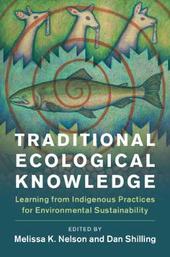
|
Traditional Ecological Knowledge: Learning from Indigenous Practices for Environmental Sustainability
Hardback
Main Details
Description
This book examines the importance of Traditional Ecological Knowledge (TEK) and how it can provide models for a time-tested form of sustainability needed in the world today. The essays, written by a team of scholars from diverse disciplinary backgrounds, explore TEK through compelling cases of environmental sustainability from multiple tribal and geographic locations in North America and beyond. Addressing the philosophical issues concerning indigenous and ecological knowledge production and maintenance, they focus on how environmental values and ethics are applied to the uses of land.Grounded in an understanding of the profound relationship between biological and cultural diversity, this book defines, interrogates, and problematizes, the many definitions of traditional ecological knowledge and sustainability. It includes a holistic and broad disciplinary approach to sustainability, including language, art, and ceremony, as critical ways to maintain healthy human-environment relations.
Author Biography
Melissa K. Nelson is an ecologist and indigenous scholar-activist. She is an associate professor of American Indian Studies at San Francisco State University. Since 1993, she has also served as the president of The Cultural Conservancy. She is the editor of Original Instructions: Indigenous Teachings for a Sustainable Future (2008) and is an active media-maker, having produced several documentary short films. Daniel Shilling worked at Arizona Humanities from 1994 until 2003, the last fourteen years as executive director, during which he developed award-winning environmental history/ethics projects. He is the author of Civic Tourism (2007) and earned the prestigious Distinguished Alumnus Award from Arizona State University.
|